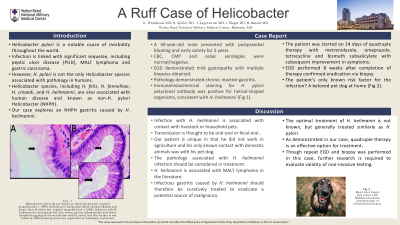Monday Poster Session
Category: Stomach
P2795 - A Ruff Case of Helicobacter
Monday, October 23, 2023
10:30 AM - 4:15 PM PT
Location: Exhibit Hall

Has Audio

Robert Spiller, DO, MS
Walter Reed National Military Medical Center
Bethesda, MD
Presenting Author(s)
Katherine M. Whitehouse, MD1, Robert Spiller, DO, MS1, Ian Lagerstrom, MD1, Brian Benson, MD2, Jared Magee, DO, MPH1
1Walter Reed National Military Medical Center, Bethesda, MD; 2Fort Belvoir Community Hospital, Fort Belvoir, MD
Introduction: Helicobacter pylori is a notable cause of morbidity throughout the world with colonization rates as high as 50% in some populations. Infection is linked with significant sequelae, including peptic ulcer disease (PUD), MALT lymphoma, and gastric carcinoma.
H. pylori is not the only Helicobacter species associated with pathology in humans. Other Helicobacter species, including H. felis, H. fennelliae, H. cinaedi, and H. heilmannii, are also associated with human disease and identified as a group known as non-H. pylori Helicobacter (NHPH). Our case explores NHPH gastritis caused by H. heilmannii.
Case Description/Methods: A 40-year-old male presented with postprandial bloating and early satiety for the last two years. Complete blood count, comprehensive metabolic panel and celiac serologies were normal/negative. An EGD showed mild gastropathy and biopsies of the antrum, incisura, and greater curvature of the stomach were obtained. Pathology review noted chronic inactive gastritis and immunohistochemical staining for H. pylori polyclonal antibody was positive for helical-shaped organisms, consistent with H. heilmannii, which are larger than H. pylori (figure 1a/b). The polyclonal antibody cross-reacts with H. heilmannii. The patient was then started on 14 days of quadruple therapy with metronidazole, omeprazole, tetracycline, and bismuth subsalicylate. He subsequently had improvement in symptoms following therapy. EGD was performed 8 weeks after completion of therapy with biopsies confirming eradication.
Discussion: Infection with H. heilmannii is associated with contact with livestock or household pets. Transmission is thought to be oral-oral or fecal-oral. Our patient is unique in that he did not work in agriculture and his only known contact with domestic animals was his pet dog.
The pathology associated with H. heilmannii infection should be a consideration when deciding to treat NHPH as H. heilmannii is associated with MALT lymphoma in animal models and case series. Infectious gastritis caused by H. heilmannii should therefore be curatively treated to eradicate a potential source of malignancy.
The optimal treatment of H. heilmannii is not known, but in clinical practice is usually done similar to that of H. pylori and as demonstrated in our case, quadruple therapy is an effective option for treatment. Though repeat EGD and biopsy was performed in this case, further research can be performed to determine whether non-invasive testing could be used for confirmation of eradication.

Disclosures:
Katherine M. Whitehouse, MD1, Robert Spiller, DO, MS1, Ian Lagerstrom, MD1, Brian Benson, MD2, Jared Magee, DO, MPH1. P2795 - A Ruff Case of Helicobacter, ACG 2023 Annual Scientific Meeting Abstracts. Vancouver, BC, Canada: American College of Gastroenterology.
1Walter Reed National Military Medical Center, Bethesda, MD; 2Fort Belvoir Community Hospital, Fort Belvoir, MD
Introduction: Helicobacter pylori is a notable cause of morbidity throughout the world with colonization rates as high as 50% in some populations. Infection is linked with significant sequelae, including peptic ulcer disease (PUD), MALT lymphoma, and gastric carcinoma.
H. pylori is not the only Helicobacter species associated with pathology in humans. Other Helicobacter species, including H. felis, H. fennelliae, H. cinaedi, and H. heilmannii, are also associated with human disease and identified as a group known as non-H. pylori Helicobacter (NHPH). Our case explores NHPH gastritis caused by H. heilmannii.
Case Description/Methods: A 40-year-old male presented with postprandial bloating and early satiety for the last two years. Complete blood count, comprehensive metabolic panel and celiac serologies were normal/negative. An EGD showed mild gastropathy and biopsies of the antrum, incisura, and greater curvature of the stomach were obtained. Pathology review noted chronic inactive gastritis and immunohistochemical staining for H. pylori polyclonal antibody was positive for helical-shaped organisms, consistent with H. heilmannii, which are larger than H. pylori (figure 1a/b). The polyclonal antibody cross-reacts with H. heilmannii. The patient was then started on 14 days of quadruple therapy with metronidazole, omeprazole, tetracycline, and bismuth subsalicylate. He subsequently had improvement in symptoms following therapy. EGD was performed 8 weeks after completion of therapy with biopsies confirming eradication.
Discussion: Infection with H. heilmannii is associated with contact with livestock or household pets. Transmission is thought to be oral-oral or fecal-oral. Our patient is unique in that he did not work in agriculture and his only known contact with domestic animals was his pet dog.
The pathology associated with H. heilmannii infection should be a consideration when deciding to treat NHPH as H. heilmannii is associated with MALT lymphoma in animal models and case series. Infectious gastritis caused by H. heilmannii should therefore be curatively treated to eradicate a potential source of malignancy.
The optimal treatment of H. heilmannii is not known, but in clinical practice is usually done similar to that of H. pylori and as demonstrated in our case, quadruple therapy is an effective option for treatment. Though repeat EGD and biopsy was performed in this case, further research can be performed to determine whether non-invasive testing could be used for confirmation of eradication.

Figure: Helicobacter pylori (A) are helical or spiral-shaped (oil, original magnification x 1000). Helicobacter heilmannii (B) are helical-shaped and larger than H. pylori (oil, original magnification x 1000). Infection with H. heilmannii is associated with less severe gastric inflammation and fewer lymphoid aggregates than infection with H. pylori, but this feature is not useful in differentiating these two organisms on histologic evaluation.
Disclosures:
Katherine Whitehouse indicated no relevant financial relationships.
Robert Spiller indicated no relevant financial relationships.
Ian Lagerstrom indicated no relevant financial relationships.
Brian Benson indicated no relevant financial relationships.
Jared Magee indicated no relevant financial relationships.
Katherine M. Whitehouse, MD1, Robert Spiller, DO, MS1, Ian Lagerstrom, MD1, Brian Benson, MD2, Jared Magee, DO, MPH1. P2795 - A Ruff Case of Helicobacter, ACG 2023 Annual Scientific Meeting Abstracts. Vancouver, BC, Canada: American College of Gastroenterology.

